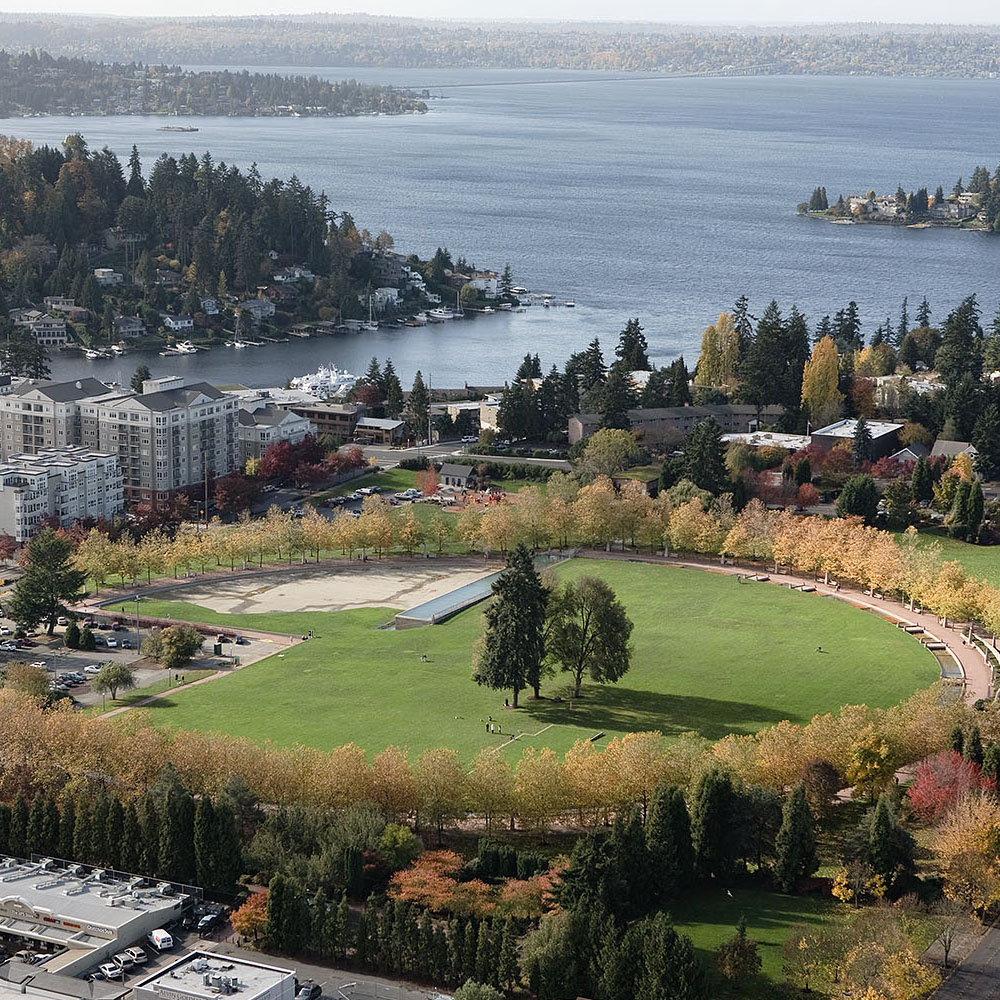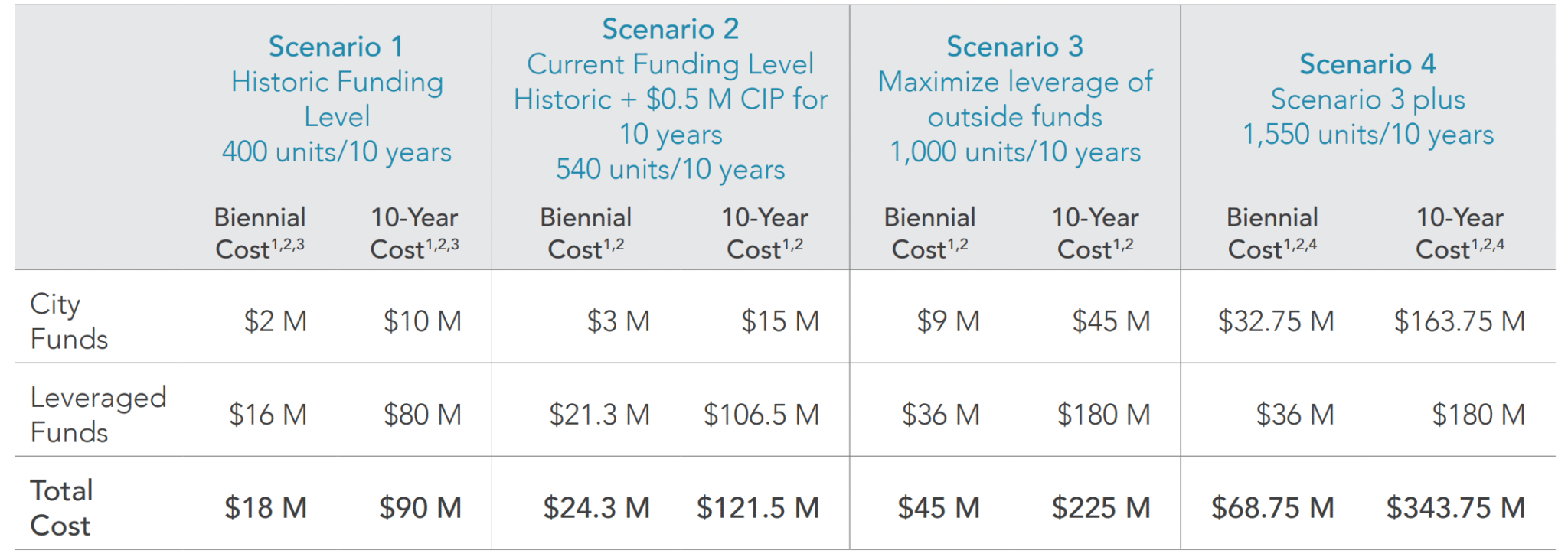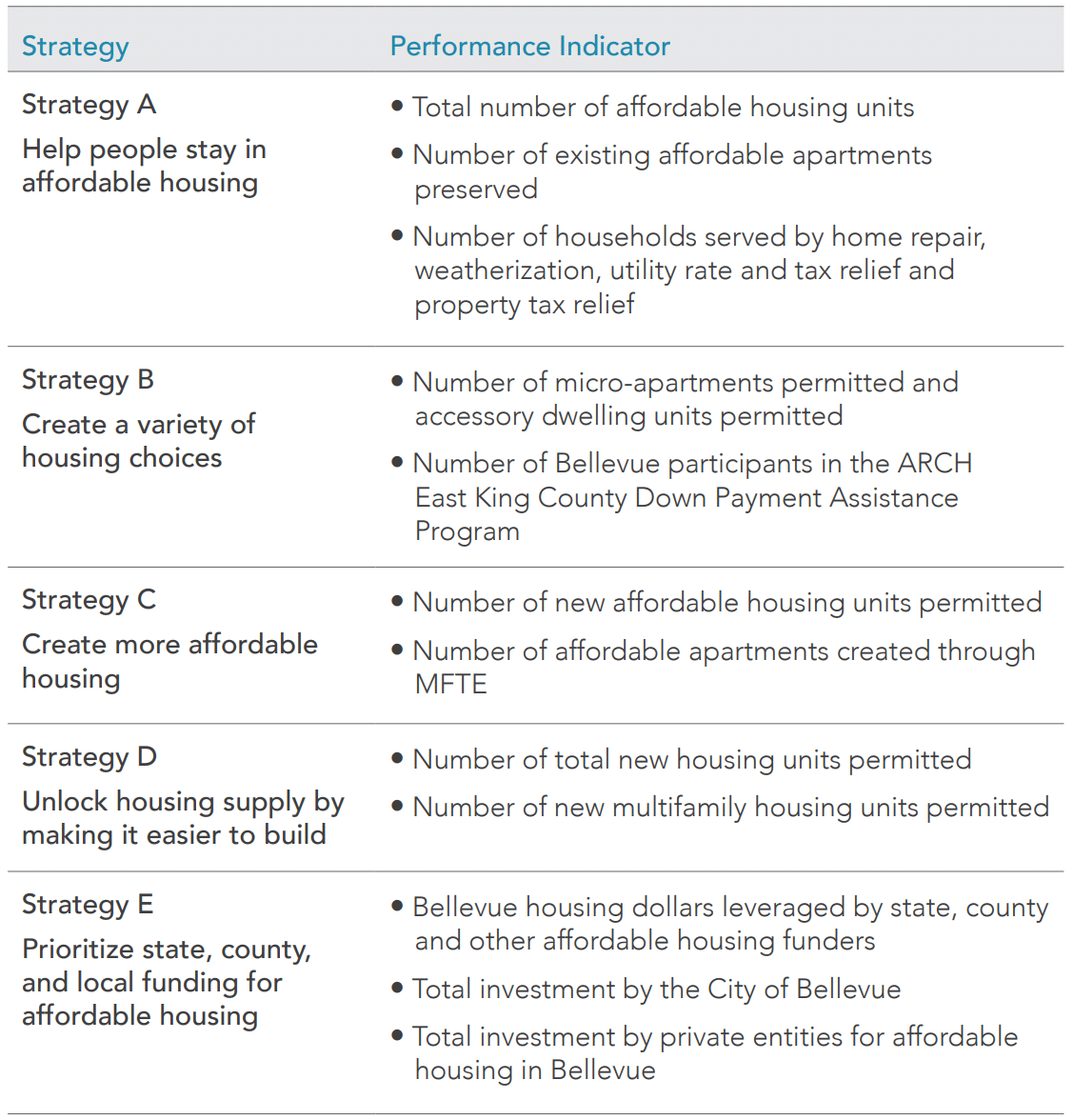Bellevue

Locality: Bellevue, Washington (USA)
City Population: 147,599 (2018)
Metro Population: 4.0 million (2018)
Plan Title: City of Bellevue Affordable Housing Strategy
Date of Plan: June 2017
Date of Case Study: December 2020
Substantive highlights
After years of struggling with rising housing prices and a shortage of affordable units, the City of Bellevue, Washington developed an Affordable Housing Strategy (“the Strategy”). To address its housing affordability challenges, the Strategy’s Technical Advisory Group recommended bold and collaborative actions above current city programs and for the creation and preservation of 4,500 affordable housing units over the course of ten years. The Strategy primarily seeks to address the housing needs of young people, families, new homeowners, and seniors, with policies focused both on households earning less than 50% of Area Median Income (AMI) and those earning between 50% and 80% AMI.
Principal Goals:
- Create or preserve 2,500 homes affordable to households earning less than 50% AMI
- Create or preserve 2,000 homes affordable to households earning between 50% and 80% AMI.
To achieve its principal goals, the Strategy lays out 21 actions grouped into five strategy areas (see “Policy Tools” below for proposed actions under each category):
- Help people stay in affordable housing
- Create a variety of housing choices
- Create more affordable housing
- Unlock housing supply by making it easier to build
- Prioritize state, county, and local funding for affordable housing
Process
In recent years, the City of Bellevue’s housing market has been greatly impacted by the Puget Sound region’s strong economy and significant job growth. The City saw a 14% increase in population between 2010 and 2019, but residential development did not keep pace with the increased need. As a result, housing prices across the area skyrocketed, raising concerns over the housing stability of the city’s senior and low-income populations and prompting City leaders to develop an Affordable Housing Strategy to guide its response to these challenges.
As a first step in developing the Strategy, the City commissioned a Housing Needs Assessment. Presented to the City Council in March 2016, the Assessment highlighted the urgent need for action to create and preserve affordable housing. The Assessment found that 35% of renters and 31% of Bellevue households overall are cost-burdened (spending more than one- third of their gross income on housing costs). Per the Assessment, Bellevue’s existing affordable housing stock and supply pipeline were not adequate to meet the scale of housing need in the city.
To address the affordability challenges detailed in the Assessment, the City of Bellevue worked to develop a suite of targeted actions for the Affordable Housing Strategy, oriented towards the goal of creating and preserving 4,500 affordable homes over ten years. The Strategy was developed by staff from Bellevue’s Department of Community Development, staff from A Regional Coalition for Housing (ARCH, an organization of fifteen cities and King County dedicated to increasing affordable housing in the area), and outside consultants. The consultants who worked on the project included the National Development Council, ECONorthwest, Broadview Planning, Latina Creative Agency, and Jaclyn Gault Design.
In developing the Strategy, its authors conducted an extensive review of practices implemented in various U.S. localities to enhance housing affordability; they also conducted deeper-dive case studies on the strategies used by Portland (OR), Arlington (VA), and Boulder (CO). The Strategy was also informed by a robust community engagement process that solicited resident input on housing affordability priorities and concerns. This engagement included community meetings, stakeholder workshops, public Council, Commissions, and Advisory Group meetings, and online outreach, including an open house and survey. The public education and input process concluded in March 2017 with a workshop on the Strategy’s draft affordable housing actions.
Additionally, Bellevue’s Mayor convened a Technical Advisory Group (TAG) comprising individuals with relevant expertise to provide technical guidance to City, ARCH staff, and consultants in developing the Strategy, as well as assess the potential impact of the proposed actions. The TAG met more than ten times between May 2016 – April 2017. The Strategy was finalized and approved by the City Council in June 2017. City Council will ensure that the actions outlined in the Strategy will be carried out in the three years following its release.
Metrics, targets, and implementation
The Strategy includes specific implementation metrics to track and report out over the course of its ten-year scope. Its primary goals are to create and preserve 2,500 units affordable to households earning less than 50% AMI, and 2,000 homes for households at 50% to 80% of AMI. The Strategy also breaks out the level of unit creation that each set of actions are expected to achieve if implemented, and the funding necessary to realize those actions (see “Policy Tools” below for proposed actions under each category):
Help people stay in affordable housing: Preserve housing stock and support programs that stabilize expenses for residents.
Goal: 55-110 units created/preserved; 10-year $660K – $1.3M public investment
Create a variety of housing choices: Offer more types of housing, including lower-priced options in neighborhoods within walking distance of jobs, transit, shopping, and services.
Goal: 200-600 units created/preserved; no direct public investment
Create more affordable housing: Increase the amount of affordable units for people at lower and moderate-income levels.
Goal: 340-1,100 units created/preserved; 12-year $4.2M – $12M public investment
Unlock housing supply by making it easier to build: Increase the total amount of housing to better meet market demand and relieve pressure on overall cost of housing.
Goal: no unit creation/preservation target; no direct cost
Prioritize state, county, and local funding for affordable housing: Expand the types and amounts of funding available to support affordable housing.
Goal: 800-1,900 units created/preserved; 7 to 10-year $65M – $110M public investment
Progress on the implementation of the twenty-one actions in the Strategy is reported to Council every six months. The Strategy stipulates that performance monitoring findings will be reported to the Council every three to five years and will include information on status and progress with regards to the following indicators:
The Strategy indicates that the City Council will review and adjust the plan as needed based on performance, new information, etc.
Implementation status
The Strategy was approved by City Council in June 2017. As of October 5, 2020 implementation had yielded the development and preservation of 1,118 affordable housing units and 100 shelter beds using direct subsidies and incentive programs; this includes 642 preserved units. (Note: Preservation of housing was substantially impacted by a $60 million philanthropic contribution from Microsoft to the King County Housing Authority, which enabled the preservation of 566 low and moderate-income rental units. This funding is part of Microsoft’s $750 million affordable housing program launched in 2018 to address the area’s skyrocketing housing prices.) As of this date, about 632 new additional affordable units were in the development pipeline. By comparison, prior to implementation of the Strategy, Bellevue created an average of less than 80 affordable units/year. The City has also reported garnering $2.9M in in-lieu fees from developers since 2015.
Of the 21 actions detailed in the Strategy, seven had been implemented as of March 2020. See all March 2020 updates, here.
Coverage of four policy pillars
| Not Covered | Moderate FocusA pillar is a Moderate Focus of a housing strategy when the strategy addresses it, but in a minor or secondary way, such as by including only one policy of modest projected impact from the pillar. | Substantial FocusA pillar is a Substantial Focus of a housing strategy when the strategy includes policies falling within multiple functional subcategories of that pillar or at least one policy projected to have a large impact. | |
| Create and preserve dedicated affordable housing units | ✓ | ||
| Promote affordability by reducing barriers to new supply | ✓ | ||
| Help households access private-market homes | ✓ | ||
| Protect against displacement and poor housing conditions | ✓ |
Participating agencies
| No Role | Supporting Role | Leading Role | |
| Mayor/City Council | ✓ | ||
| Office of the City/County Manager | ✓ | ||
| Regional Housing Agency (ARCH) | ✓ | ||
| Planning Department (Department Community Development) | ✓ | ||
| Development Agency (Department of Planning and Community Development) | ✓ | ||
| Permitting/Inspections Department | ✓ | ||
| Finance/Tax Department | ✓ | ||
| Public Housing Authority | ✓ |
Policy tools
The Strategy identifies the following specific strategies and actions, organized under the categories below:
Help people stay in affordable housing
- Partner with non-profit organizations and housing agencies to fund the purchase of existing, affordable multifamily housing to preserve it for the long term.
- Advocate for state legislation to extend property tax exemptions to existing multi-family properties that agree to set aside some apartments as affordable
- Promote programs that provide social and physical support to help seniors and people with disabilities remain in their homes
- Expand the city’s home repair and weatherization programs
- Promote energy efficiency in design and construction of affordable units
- Promote existing utility rate relief, utility tax relief, and property tax relief programs for income-eligible residents.
Create a variety of housing choices
- Encourage micro-apartments around light rail stations through actions such as reduced parking requirements.
- Update accessory dwelling unit standards and allow detached units in self-selected neighborhoods.
- Promote design in affordable units that ensures accessibility for all ages and abilities (i.e. “universal design”).
- Consider changes to the down payment assistance program for low-income and first time homebuyers.
Create more affordable housing
- Increase development potential on suitable land owned by public agencies, faith-based and non-profit housing entities for affordable housing.
- Develop affordable housing on suitable surplus public lands in proximity to transit hubs
- Update existing tax exemption programs for affordable housing to increase participation by developers of new housing.
- Inclusionary zoning: increase zoning as an incentive to provide affordable units in new development.
- Reduce costs of building affordable housing through, e.g., code amendments, lower fees, reduced parking, city-funded street improvement
Unlock housing supply by making it easier to build
- Revise code to reduce costs and process time for building multi-family housing
- Rekindle interest in condominium development by advocating for amendments to state condominium statutes
- Change the city’s approach to density calculation in multi-family zones to allow more flexibility in unit size and type
Prioritize state, county, and local funding for affordable housing
- Tap additional local sources to dedicate more funding to affordable housing (e.g. reallocation of general fund and/or REET, increase of property tax and/or business & occupation tax, bonds).
- Pursue funding partnerships with employers, financial institutions, foundations, and others.
- Advocate for legislative actions that expand state and local funding tools.
Income groups targeted
| Little/No Focus | Moderate Focus | Substantial Focus | |
| 0-30% AMI | ✓ | ||
| 30-60% AMI | ✓ | ||
| 60-80% AMI | ✓ | ||
| 80-120% AMI | ✓ | ||
| Market Rate | ✓ |
Key policy objectives or issues addressed
- ✓ Increasing rental affordability
- ✓ Expanding affordable housing in resource-rich neighborhoods
- ✓ Preserving the affordability of subsidized rental housing
- ✓ Reducing housing discrimination
- ✓ Increasing homeownership
- ✓ Increasing housing supply
- ✓ Increasing rental affordability
- ✓ Preventing displacement
Which linkages are addressed
- ✓ Transportation
- ✓ Environment / Energy
Which local funding sources are proposed?
- ✓ General fund
- ✓ Affordable housing contingency fund
- ✓ General Sales Tax Revenue
- ✓ Private-activity bonds
- ✓ Tax increases (property tax, business & occupation tax)
- ✓ Reallocation of general fund monies
- ✓ Real estate excise tax

Additional resources
Affordable Housing Strategy Compiled Appendices (Existing Program Summary, Council Approved Potential Actions List, Housing Needs Assessment, Effective Practices, Public Engagement Summary, Technical Advisory Group Discussion of Draft Actions):
https://bellevuewa.gov/sites/default/files/media/pdf_document/REV3_Compiled_Appendices.pdf
City of Bellevue Housing Needs Assessment:
https://bellevuewa.gov/sites/default/files/media/pdf_document/ATTACH_3%20Draft%20Housing%20Needs%20Assessment.pdf
Affordable Housing Strategy Implementation Briefing (10/5/2020):
https://bellevue.legistar.com/LegislationDetail.aspx?ID=4657385&GUID=4382C565-C33F-4607-8DB3-20ED1DCD1D7E
Council Roundup: Affordable Housing Strategy Success:
https://bellevuewa.gov/city-news/council-roundup-affordable-housing-strategy-success
Microsoft Chips in for Major Affordable Housing Strategy Around Seattle:
https://www.archpaper.com/2019/10/microsoft-affordable-housing-strategy-seattle/
A Regional Coalition for Housing:
https://www.archhousing.org/
